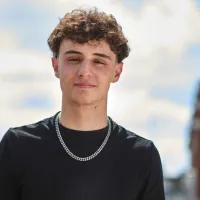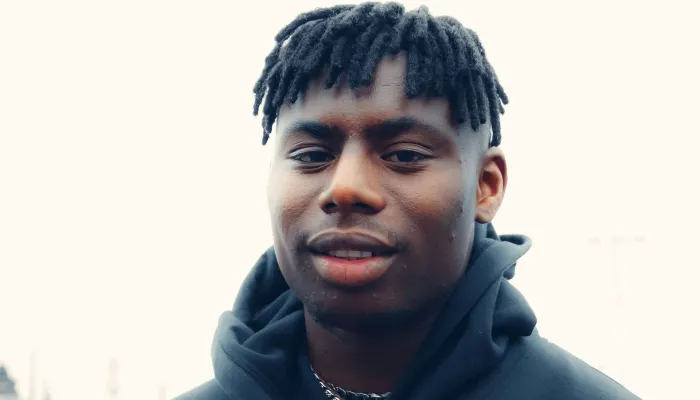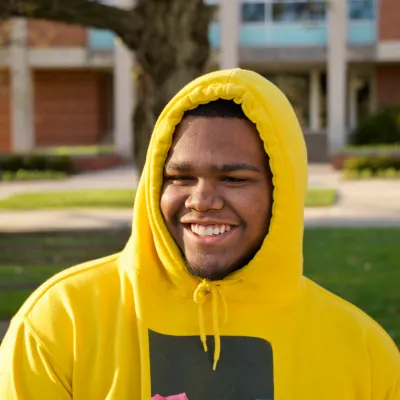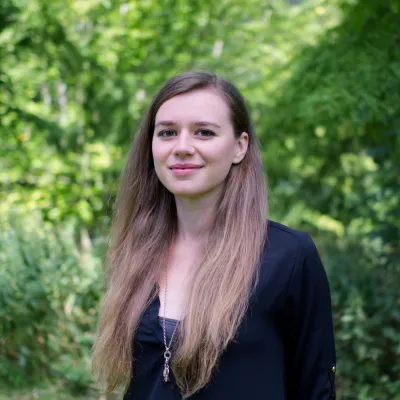Mr B*, 20, came to the UK from Sudan in 2024 and was moved to Manchester shortly after he arrived. However after getting his refugee status he was evicted from his hotel and began rough sleeping. He reached out to Centrepoint for support and who helped him to get stable accommodation. He is now starting a new job and thinking about his future.
Arriving in the UK
Mr B, 20, came to the UK as a refugee from Sudan in 2024, landing in Dover after a long journey to reach safety. He remembers when he first arrived in the country that he didn’t know where he might end up or what would happen next. After staying at a hotel in Dover for a few days, he was put in a taxi with the people he was staying with – he thought that he was being driven to London, but during the journey it was explained that they were being taken to Manchester.
“I remember that we were in the small hotel in Dover and then after that they take you to different places. And I remember my roommate asked me what city you want to go to, and I said I don’t care, any city because I really thought they were going to take me to London because a lot of people are just taken to London.”
“After that they told us, ok you are leaving tomorrow. You ask your driver where you are going. We asked him where we were heading, and he said we are going to Manchester City. It was a bit of a surprise because we didn’t expect to come to Manchester.”
As soon as he arrived in Manchester he was placed in a hotel whilst his refugee status was reviewed by the UK Government. After spending four months in the hotel, Mr B was then made aware that he had received his refugee status – something that he should have felt relieved by. However, when he received his status, it meant that he could no longer stay in the hotel and had to leave immediately. As he didn’t have any connections with the city or know where he could go, he began to sleep rough whilst he spoke with the council to see how support they might be able to provide him.
“When I was in the hotel, I realised that after everyone got refugee status, they had to leave the hotel and go and communicate with the local council to find alternative accommodation for him or for her.”
Finding Centrepoint
After being evicted from the hotel, Mr B remembers that a friend, who was in a similar situation, had been supported by Centrepoint. After arriving at the service, he met with Ryeika, a homelessness prevention and relief worker, who supported him during his initial appointment and began to reach out to services where he could stay. After several referrals and a couple of weeks of contact, Ryeika was able to find a suitable accommodation for Mr B.
“I had one of my friends, who came here before me and came to Centrepoint and he told me ok you should go, you are under 25 and Centrepoint will be able to help you and provide you with more support and also help with your housing problems.”
“He told me he got temporary accommodation through Centrepoint, and I said ok, let’s go and give it a try. I came here to Centrepoint, and I got an appointment for the next few days and then I came back and had an interview and after being in contact for two weeks, she did a lot of referrals on my behalf and then found me some accommodation.”
“So, after two weeks, she called me and said that there was a hostel, and we should move there to that hostel.”
Moving to a new home
However, due to some traumatic experiences from his past and his journey to the UK, the hostel that was found for Mr B was not suitable for him. He explained this to Ryeika who began to look for other options that could work for him. However, during this time, he felt unable to stay in the accommodation and decided to sleep rough until a new home was found.
“But when I arrived at the hostel, I found that it didn’t meet my needs. So, I spoke with her again and explained to her the situation and everything and why I wouldn’t be able to stay there. And she said ok, we can find you something else but we don’t know how long that will be. So, I didn’t know how long I would be outside again, but I thought that’s ok I can wait outside but I cannot be there.”
After spending a couple of nights sleeping rough, Ryeika reached out again to Mr B to let him know that a space in a Rough Sleeper's property, which would be better suited to him, had become available. As soon as he saw the property, Mr B knew that this was a good option for him, and he signed the contract there and then.
“And after that I spent two days outside and she called me again and told me that they had found another accommodation, and this one was better than the hostel. And I said let’s go and see it and so I came here, I signed the tenancy agreement and then I moved to the temporary accommodation that I’m in now.”
During all this time of unstable housing and uncertainty, Mr B was still attending college and the Job Centre every day. Each morning, he had to make sure to manage his time carefully so that he could balance making his appointments and meeting his basic daily needs. Keeping on top of this, whilst not knowing where he might be staying that night, was incredibly challenging. Being able to manage this difficult living position and maintain his time keeping and organisation is truly a testament to his dedication and determination to change his situation.
Now that he has his new accommodation he has reflected on the importance and value of having a fixed placed to stay and the impact this can have in helping him to reach his goals.
“I would say the current accommodation I’m living in is really helpful because I remember at the time when I was studying at college, I was homeless, and I’ve been outside for a while and that was very difficult to manage my time and to attend my classes on time. Also, for me to be able to go to my appointments and some with the Job Centre, because I was going for appointments there every week – there was a lot of appointments actually. And if you don’t have proper accommodation to organise your time and your life, it will be very difficult, and you will be very messy. You know you won’t be able to do anything, so I think accommodation is something essential in everyone’s life.”
“If you’re sleeping outside and you’ve got an appointment at 10 or 9 at the same time you have to find some place to wash your face, clean your mouth, your teeth and then find some breakfast. That’s going to be something very challenging. It needs a lot of organising to manage your time to be in the right place at the right time. So, it’s not that easy”.
Whilst rough sleeping, Mr B was clear that his main goal was to raise his own potential and achieve what he can, trying to maintain a positive mindset that things will change, no matter what was happening around him.
“I don’t expect anything but to raise my potential. But at the same time, I have to do what I have to do in the meantime. So, if I don’t get something or I’ve been trying like to find some accommodation – I will accept it and I will try to tell myself that it’s fine but this is just a matter of time and some time I will be able to see my situation change for the better”.
Working with Centrepoint
Throughout his experiences, Mr B remembers how supportive and attentive the Centrepoint team were, regularly checking in with him and making sure that he had what he needed and were there to help with any questions he might have.
“I would say Jordan has been a real support. He was really helpful because all of the time he was in contact with me and calling me during the week and asking me if everything was ok and what I needed and how he might be able to help me. Most of the people you meet here at Centrepoint are very cool people and I’m very appreciative of that”.
Whilst being supported to find appropriate housing, Mr B has been able to work with different services around Centrepoint such as with the therapists and jobs and education advisors. He’s grateful for the support of Jo, Principal Psychologist, who has helped him be able to talk about events in his life that otherwise felt too challenging, now feeling more comfortable to open up and share these experiences, in a supportive environment.
“Centrepoint have helped me a lot because I’ve been taking appointments with Jo the therapist. Because of my journey in the past, she actually helped me a lot because my life was a little bit more difficult. But since I met her and I spoke with her about my journey and that there are some specific stories in my life that I wasn’t ok to share with anyone else, but after speaking I was able to share with her and feel more confident about that. And I feel more comfortable and more accepted. At the beginning it was something I was trying to keep to myself, but meeting Jo has been very helpful for me”.
Whilst working with Jo in a therapeutic capacity, Mr B has also been working with Jamie, Jobs and Education Advisor, to find a role that he’s interested in and that he can do whilst also finishing his studies. He’s grateful for how much Jamie advocated for him in finding a job and the amount of time and energy he dedicated to contacting potential employers.
“I’ve been working with Jamie to find a job and actually he did a great job because he has been contacting a lot of people. I told him that I’m looking for a part-time job, because for me, I would prefer to be working rather than doing nothing.”
After lots of phoning and visiting locations around Manchester, Jamie was able to find Mr B a role in a Manchester hotel as a receptionist. Mr B had been able to gain experience of working in a similar role whilst volunteering with another homelessness support organisation in Manchester, Mustard Tree, so was excited to put the skills he had learnt from there into practice.
“He was like trying to help me find a job and eventually we found a part-time job and now I’m doing my training with them and it’s really great. So hopefully I’m going to start the job in the next month.”
“It is a receptionist at a hotel and it’s really great. I’ve got a bit of experience as a receptionist from Mustard Tree because I’ve be volunteering with them for almost six or seven months. I remember I was volunteering in the shop there for almost four months and after that they decided that I had a lot of different skills and put me on the reception. It was the first time they ever put someone as a volunteer on reception. And it was really helpful for me because I got to speak with a lot of different people every day and to help them out”.
“They have a lot of different places for people to volunteer like doing the coffees or in the restaurant or the warehouse but at the same time they decided that I had good experience communicating with people and moved me to reception and that was really nice. And now they’ve decided to put reception on as part of the volunteering options for people in the future”.
Thinking about the future
With Mr B about to start his new job, he was excited about the opportunities on the horizon for him and all the skills he can learn through this role. He is also currently finishing college, where he has been gaining his qualifications in English and functional skills, something that he hopes will open a lot of doors in the future for him.
“This is actually the last level, so this is going to be functional level 2. So, there are no more levels in the language and after I finish my level 2, I’ve got my certificate. After that I will see what comes next because with the level 2 it will open a lot of different doors in my life. There are some jobs that require level 2 functional skills and if I’ve got that, that’s a really pretty good thing and that’s what I’m hoping.”
For Mr B, when thinking about the future, he knows that being flexible and being able to change direction is important, as he wants to be prepared for whatever happens and is open to experiences that comes his way. He also wants to focus his attention on his steps for the near future, rather than planning too far ahead, to help him acclimatise to a new situation and work out what he wants and how he can get there.
“At the moment, other than this new job, I have some plans for the future, but at the same time I won’t be able to focus on them more because I believe that I need to focus on the near future at the moment. Like how to start in this world and after that I will be able to think about what comes next after that. But for now, I would say just to focus on the near future.”
“Sometimes even if I put like some dreams or something in the future like I have to be flexible to like to change my plans according to the circumstances or the situation that I’m in. It’s all about flexibility. Like before, I never thought I was going to be working in the reception. But in the future maybe who knows where I’m going to be, maybe in some place different. I’m open to anything.”
He does know for certain though that, if he can, he would like to stay in Manchester. After being the only place he has lived after arriving in the UK, he has grown a connection to the city as somewhere he can navigate completely on his own.
“Manchester is a really nice place and I’m not intending on leaving the city. Maybe I’ll visit some places but I’m always going to be coming back here – it’s a really nice place.”
“I know a lot about this city and every place of it. I know most of the Manchester City because I’ve been to a lot of different places. That’s a nice thing. If one of my friends told me that I’m in this place I would find them. So that’s a good thing because now I don’t have to use Google maps.”
Reflecting on his experiences
Although only working with Centrepoint for a few months, Mr B has been grateful for the support and guidance they have given him in getting him back on his feet and taking important steps towards an independent life. He reflected on the impact of working with so many teams around Centrepoint and how this is something that would follow him into his future.
“I didn’t expect in my life that I would be able to be working with a lot of different people at the same time. And this is a really good thing because now I would say this is a very good experience because I’ve been working like with different people at different times. And that is something new to me completely. And I would say this is going to be an experience that I will be a part of me in the future, you know to be a part of any society I want. So that’s a really nice thing.”
After thinking back on his own journey and what he has learnt along the way, for Mr B there is some clear advice and learnings he would share with other young people who might be going through similar experiences. For him, being able to learn English and communicate with others to help him get used to his new surroundings has been vital. After dedicating so much of his time to learning English and trying to assimilate into society, he has found it challenging when his friends and peers have not done the same and his piece of advice would be for young people to try, if they can, to find ways to learn the language to help them feel more a part of their surroundings.
“I have been thinking and seeing in a lot of my friends that after they got temporary accommodation they don’t do anything, they’re just sleeping, staying home, doing nothing useful, no studying just doing nothing and then sometime I will find that they have been here for a very long time and they will not even be able to speak the language. And that’s a really bad thing”.
“Because I believe that every place you are intending to be there to live, you should or you must learn the language, because that’s the key to be able to communicate with people. If you don’t know the language, it’s going to be very complicated because sometimes my friends will call me and even small things they will ask me to translate. But if they were able to speak English that would be easier for them and their lives would be better. I would say studying to learn the language would be my advice to give to other people. Language is very important. Without language it’s very difficult”.
It's been amazing to see the progress that Mr B has made during his time with Centrepoint, and we are very proud of all of the steps he has been able to take. We wish him all the best with his next steps for the future!
*Names have been changed to protect young people's identities

Make a donation
With your support, we can get more young people like Mr B move into stable accommodation and begin to rebuild their lives.




